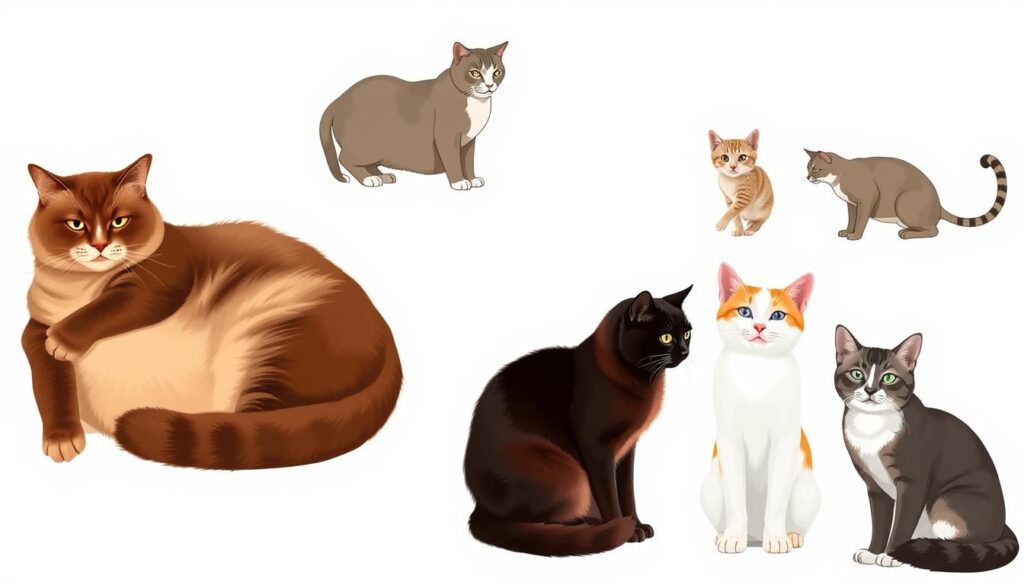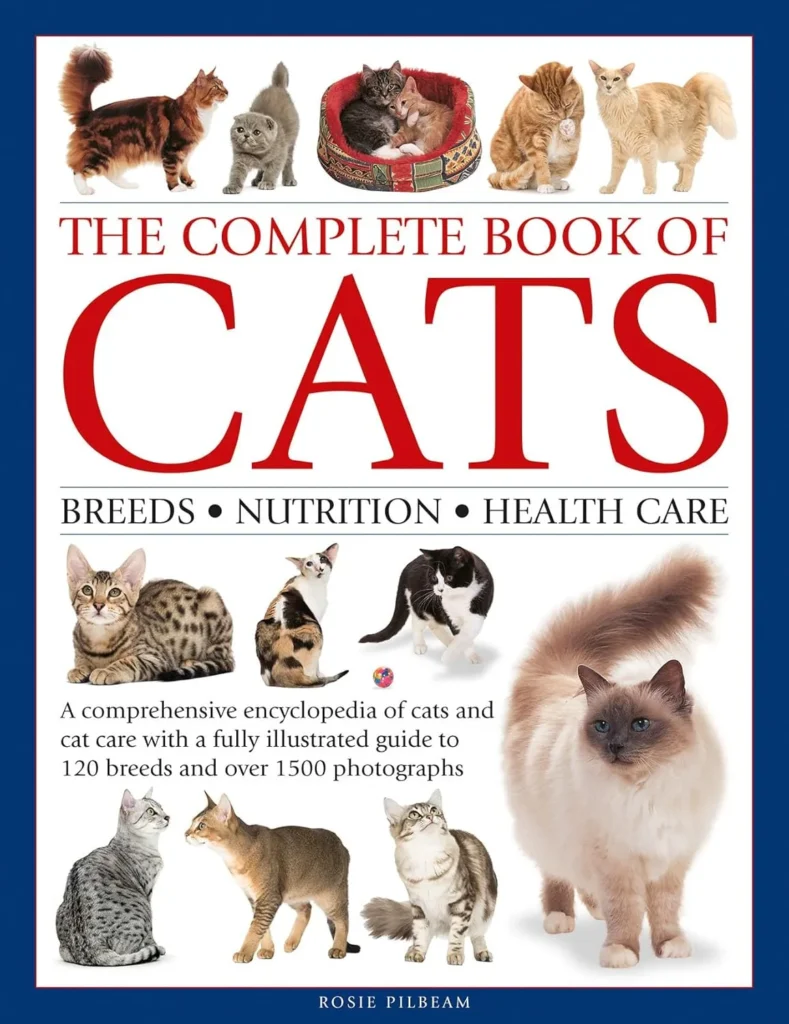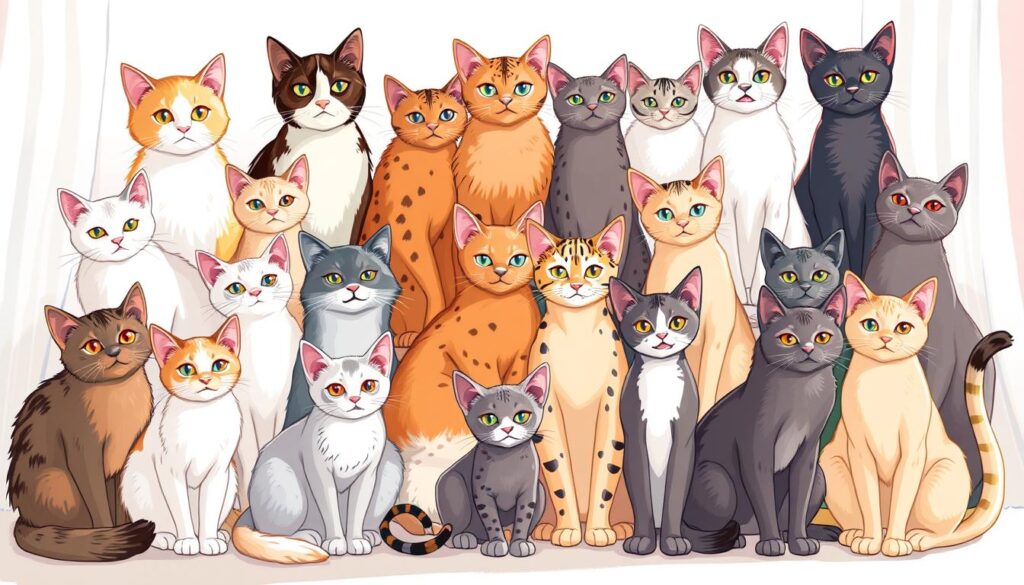I’ve always been fascinated by the different sizes and shapes of cats. From the big Maine Coon to the small Siamese, each breed is unique. Knowing the average weight of different breeds helps us understand their health and care needs.
In this guide, we’ll look at the average weights of various cat breeds. This knowledge helps you make better decisions for your cat’s health. We’ll explore what makes a cat’s size different and the healthy weight ranges for each breed. Let’s start this journey together and learn how to keep our cats happy and healthy.
What is an Ideal Cat Weight?
Keeping your cat at a healthy weight is key for their happiness and health. The right weight for a cat depends on their breed, age, and gender. Most healthy domestic cats weigh between 8-12 pounds (3.6-5.4 kg).
Factors Affecting Cat Weight
Several things can influence your cat’s weight. For example, bigger breeds like Maine Coons can weigh up to 25 pounds. Smaller breeds might only weigh 5 pounds. Age also matters, as kittens grow about 100g each week until they’re fully grown at 44 weeks.
Other factors include if your cat is neutered or spayed, their lifestyle, and any health issues. Knowing these can help keep your cat at a healthy weight.
Average Weight Range for Domestic Cats
The general healthy weight for a domestic cat is 8-12 pounds. But, this can change a lot depending on the cat. Cats are considered overweight if they’re 10% over their ideal weight. They’re obese if they’re 20% or more over.
In 2018, 33.8% of cats in the U.S. were obese, and 25.7% were overweight. To keep your cat healthy, talk to your vet. They can give advice tailored to your cat’s needs.
Kitten Weight Chart by Age
Watching your kitten’s weight is key for their health. A kitten weight chart by age helps track their growth. Kittens grow fast, doubling their birth weight in just a week.
At birth, kittens weigh between 12 ounces to 1.3 pounds. By five weeks, they can be between 14 ounces to 1.8 pounds. By eight weeks, they weigh from 1.4 to 2.6 pounds, doubling from their fourth week.
As kittens grow, their weight gain slows down. But they keep gaining pounds. By six months, they look like adult cats but still gain weight. An average adult cat weighs about 10 pounds, but it can vary.
Many things affect kitten growth, like genetics, nutrition, and health issues. It’s important to watch your kitten’s weight and feed them right. If you’re worried, talk to your vet.
Average Cat Weight by Breed
Feline weight can vary a lot based on the breed. Knowing the average cat weight by breed is key for your cat’s health. Let’s look at the weight ranges for small, medium, and large cat breeds.
Small Breed Weights
Smaller cat breeds, like the Siamese, usually weigh 5-10 pounds for females and 10-15 pounds for males. These cats are known for their slender build and graceful movements.
Medium Breed Weights
Medium-sized breeds, like the Domestic Shorthair, weigh 8-10 pounds. They are a good mix of compact and muscular, making them common household pets.
Large Breed Weights
Large breeds, like the Maine Coon, can weigh 10-25 pounds. These cats are known for their size and fluffy coats. But, their weight should still be moderate for their health.
| Breed | Female Weight (lbs) | Male Weight (lbs) |
|---|---|---|
| Siamese | 5-10 | 10-15 |
| Domestic Shorthair | 8-10 | 8-10 |
| Maine Coon | 10-15 | 15-25 |
Keep in mind, these are general weight ranges. Individual cats may vary. Always check with your vet to find the perfect weight for your cat.
Male vs Female Cat Weights
Gender is a big factor in cat weights. Male cats usually weigh more than females. This is true for many cat breeds.
For example, a male Siamese cat can weigh 11-15 pounds. A female Siamese cat weighs 8-12 pounds. Male Maine Coon cats weigh 18-22 pounds, while females weigh 8-12 pounds.
Spayed or neutered cats can gain weight easily. This is because their metabolism slows down. It’s important to keep their weight in check for their health.
| Breed | Female Weight Range | Male Weight Range |
|---|---|---|
| British Shorthair | 4.0kg to 6.8kg (9lb to 15lb) | 5.4kg to 8.1kg (12lb to 18lb) |
| Maine Coon | 3.6kg to 5.4kg (8lb to 12lb) | 8.2kg to 10kg (18lb to 22lb) |
| Siamese | 3.6kg to 5.4kg (8lb to 12lb) | 4.5kg to 6.8kg (10lb to 15lb) |
| Persian | 3.1kg to 4.5kg (7lb to 10lb) | 4.0kg to 5.8kg (9lb to 13lb) |
| Ragdoll | 3.6kg to 6.8kg (8lb to 15lb) | 4.5kg to 10kg (10lb to 22lb) |
The table shows the weight differences between male and female cats. It’s key to know these differences. This helps owners give their cats the right care and food for a healthy life.

Average cat weight by breed
Cats of different breeds can vary a lot in weight. Knowing the typical weight for each breed helps owners see if their cat is at a good weight.
Most domestic cats weigh between 8 to 10 pounds. But, bigger breeds like the Maine Coon can reach up to 25 pounds. On the other hand, smaller breeds, like the Siamese, might only weigh 5 to 10 pounds.
| Breed | Average Weight Range (lbs) |
|---|---|
| Abyssinian | 8-12 |
| American Shorthair | 8-12 |
| Bengal | 9-15 |
| British Shorthair | 9-18 |
| Maine Coon | 15-25 |
| Persian | 7-12 |
| Ragdoll | 10-20 |
| Siamese | 5-10 |
Age, gender, and health also play a role in a cat’s weight. Keeping your cat at the right average cat weight by breed is key for their health and long life.
“Even a couple of extra pounds can increase the likelihood of health problems in cats.”
Watching your cat’s weight and talking to a vet is important. It helps keep them healthy for their breed.
Impact of Health Issues on Cat Weight
Your cat’s weight is a key sign of its health. Some weight changes are normal, but big or sudden ones might mean a health issue. Knowing how health problems affect your cat’s weight helps you spot and fix problems early.
Conditions Contributing to Weight Gain
Some health problems can make cats gain weight. These include:
- Arthritis – Joint pain makes moving hard, leading to weight gain.
- Acromegaly – A hormonal issue that causes too much growth and weight.
- Hypothyroidism – A slow thyroid gland means less energy, leading to weight gain.
Conditions Contributing to Weight Loss
Weight loss in cats can also mean health issues, such as:
- Inflammatory Bowel Disease – Chronic gut inflammation makes it hard to absorb nutrients, causing weight loss.
- Hyperthyroidism – An overactive thyroid gland speeds up metabolism, leading to weight loss.
- Kidney Disease – Kidney problems can cause weight loss and muscle wasting.
- Dental Problems – Painful teeth make eating hard, leading to weight loss.
If your cat’s weight changes suddenly or a lot, see your vet. They can check your cat, run tests, and create a plan to help your cat stay healthy.
| Condition | Impact on Cat Weight |
|---|---|
| Arthritis | Increased weight gain due to decreased mobility and physical activity |
| Acromegaly | Excessive growth and weight gain due to hormonal disorder |
| Hypothyroidism | Weight gain caused by slowed metabolism |
| Inflammatory Bowel Disease | Weight loss due to impaired nutrient absorption |
| Hyperthyroidism | Unintentional weight loss caused by increased metabolism |
| Kidney Disease | Weight loss and muscle wasting due to impaired kidney function |
| Dental Problems | Weight loss resulting from painful eating difficulties |

Importance of Healthy Weight for Cats
Keeping a healthy weight for cats is key for their health. Obesity is a big problem in cats, leading to diabetes, arthritis, and more. A 2022 survey found 60% of U.S. cats are overweight or obese.
Obese cats live up to 5 years less than healthy ones. Starting weight management early is important. Cats that are 10-20% over ideal weight are overweight, and 21% or more are obese.
“Maintaining a healthy weight is crucial for a cat’s overall well-being. Obesity can significantly increase the risk of secondary health issues and reduce life expectancy.”
Many things can affect a cat’s weight, like breed and lifestyle. Indoor cats tend to be overweight because they’re less active. Spaying or neutering can also make cats gain weight.
Vets use body condition scores to check pets’ weight. They score from 1 (very skinny) to 5 or 9 (obese). Regular vet visits are important to keep a cat’s weight healthy.
Identifying an Overweight or Underweight Cat
Figuring out if your cat is at a good weight can be tricky. Just stepping on the scale isn’t enough. That’s where the body condition scoring (BCS) system comes in. It’s a tool vets use to check a cat’s weight.
The BCS scale goes from 1 to 9. A score of 1 means the cat is very underweight, and 9 means it’s obese. Cats with a BCS of 4 are just right, with a thin layer of fat and a clear waistline.
Body Condition Scoring
To check a cat’s body condition, gently feel their body and look at how they look. An underweight cat’s ribs, spine, and hips will be easy to feel. An overweight cat’s ribs will be hard to find because of the fat, and their belly will look different.
- Ribs: In an underweight cat, the ribs will be easily felt with minimal fat coverage. In an overweight cat, the ribs will be challenging to palpate.
- Spine: The spine of an underweight cat will feel sharp, whereas the spine of an overweight cat will be difficult to feel due to fat deposits.
- Hips: Bony hips are a sign of an underweight cat, while padded or hard-to-feel hips indicate an overweight feline.
- Waist and Abdomen: A healthy cat should have a visible waist when viewed from above and a slight tuck at the abdomen. Overweight cats may lack a distinct waist and have a bulging or sagging belly.
Remember, your cat’s vet is the best person to help figure out the right weight and body condition for your cat. They can give advice and help keep your cat happy and healthy.
Weight Management Tips
Keeping your cat at a healthy weight is key for their happiness and health. If your cat is too heavy or too light, there are ways to help them get to a good weight.
Helping Overweight Cats Lose Weight
If your cat is a bit chubby, talk to your vet about a weight loss plan. They might suggest a special diet that’s low in calories but rich in protein and fiber. Cutting down on treats and getting your cat to move more can also help.
It’s important to have a careful plan for losing weight. This keeps your cat safe and healthy while they’re getting slimmer.
Helping Underweight Cats Gain Weight
If your cat is too skinny, they need a diet that’s full of nutrients. Feed them small meals often to help them gain weight safely. You can also warm up canned food to make it more tempting.
Using toys to feed your cat can make mealtime fun. Always check with your vet to figure out the right amount of food and how often to feed your underweight cat.
It doesn’t matter if your cat is too heavy or too light. Keeping them at a healthy weight is vital for their health. With the right help from your vet and some smart strategies, you can help your cat stay at a good weight.
Maintaining an Ideal Cat Weight
Getting your cat to the right weight is a big win. But keeping them there is the real test. As your cat reaches their prime, you must stay alert to keep them at the perfect size.
For a healthy weight, start with a balanced diet of top-notch cat food. It’s important to control portions. Feed the right amount for your cat’s age, size, and how active they are. Don’t overdo it with treats or human food. Regular playtime and lots of activity are key.
Even small changes can affect your cat’s weight. So, keep a close eye on their weight and adjust their diet and exercise as needed. Regular weigh-ins and body condition scoring can help you stay on top of any concerning changes.
By maintaining an ideal cat weight through a balanced diet, right portions, and plenty of exercise, you can prevent health problems. A healthy weight means a happier, longer life for your cat.
“The key to keeping your cat at a healthy weight is to be vigilant, make adjustments as needed, and never let their weight fluctuate too much in either direction.”
Conclusion
The average cat weight changes a lot based on breed, age, gender, and health. This article gives a detailed guide on healthy weights for different cat breeds. It also shares tips on keeping your cat at the right weight.
Knowing the ideal weight for your cat’s breed is key. Taking steps to manage their diet and exercise is important. Regular vet visits help keep an eye on your cat’s weight and health.
Whether your cat is small or big, it’s vital to keep them at the right weight. This ensures their physical and emotional health. By staying informed and proactive, you can give your cat the best care.
FAQ
What is the average weight range for domestic cats?
Most domestic cats should weigh between 8-12 pounds (3.6-5.4 kg). But, their ideal weight can change based on their age, breed, gender, and health history.
What factors affect a cat’s ideal weight?
A cat’s age, breed, gender, and health can affect their ideal weight. For example, male cats are usually bigger and heavier than females. Some breeds, like Maine Coons, tend to weigh more.
How can I determine if my kitten is at a healthy weight?
There’s a kitten weight chart that shows healthy weights by age. For instance, a 0.5-year-old kitten should weigh about 5 pounds. A 1-year-old kitten should weigh around 8 pounds.
What are the average weight ranges for different cat breeds?
There’s a chart that shows the recommended weights for different cat breeds. For example, Siamese cats should weigh 5-10 pounds for females and 10-15 pounds for males. Maine Coons can be healthy at 10-25 pounds.
How do male and female cat weights compare?
Male cats are generally larger and heavier than females. For example, a male Siamese cat might weigh 11-15 pounds. A female Siamese typically weighs 8-12 pounds.
Can health issues affect a cat’s weight?
Yes, some health issues can make cats gain or lose weight. Arthritis, acromegaly, and hypothyroidism can cause weight gain. Inflammatory bowel disease, hyperthyroidism, and kidney disease can lead to weight loss.
Why is maintaining a healthy weight important for cats?
Obesity is a big health problem for cats. It can lead to diabetes, arthritis, pancreatitis, and kidney disease. Overweight cats may live up to 5 years less than healthy-weight cats.
How can I tell if my cat is overweight or underweight?
The body condition score (BCS) system helps veterinarians check a cat’s health. Cats with a BCS of 4 are at an ideal weight.
What can I do to help my cat maintain a healthy weight?
To manage your cat’s weight, try a weight loss diet and reduce treats. Encourage exercise for overweight cats. Feed underweight cats nutrient-dense food in smaller, more frequent meals. Use feeding toys to make meals more engaging.
How can I keep my cat at their ideal weight once they reach it?
Keep your cat at their ideal weight by feeding the right amount of healthy food. Limit treats and ensure they get enough exercise. Even small changes can affect their weight.

Complete Book of Cats: A Comprehensive Encyclopedia of Cats with a Fully Illustrated Guide to Breeds and Over 1500 Photographs

